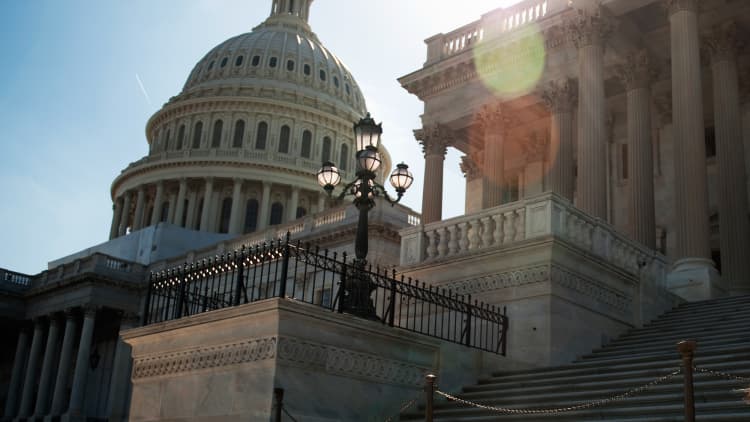The nation's two top antitrust enforcement agencies have been squabbling over who gets to probe Big Tech.
As of June, the Federal Trade Commission and the Antitrust Division of the Department of Justice had reportedly struck a deal to divide oversight of four of the country's largest tech firms. Under the supposed plan, as reported by The Wall Street Journal and other media outlets, both agencies would stick to their designated lanes: The FTC would have oversight of Facebook and Amazon, while the DOJ would handle Google and Apple.
But at a hearing in front of the Senate antitrust subcommittee Tuesday, the heads of both agencies acknowledged such a system had "broken down" in response to questioning from Sen. Mike Lee, R-UT, chairman of the subcommittee. While both agency officials said they continue to stick by clearance agreements that prevent overlapping probes, they admitted there had also been some tension over the agreement at times.
"I cannot deny that there are instances where [FTC] Chairman [Joe] Simons' and my time is wasted on those types of squabbles," said Makan Delrahim, who lead's the DOJ's antitrust division.
Unsurprisingly, lawmakers are not happy that the agencies are wasting time fighting with each other instead of digging into their investigations. The regulators are operating in a unique moment when antitrust scrutiny of Big Tech is converging from many parts of the government. But some worry the regulators will squander an opportunity to crack down on potentially monopolistic behavior due to their own infighting.
"The Big Tech companies are not waiting for you to finish your cases," Sen. Richard Blumenthal, D-Conn., warned during Tuesday's hearing, noting Facebook is "cementing" its acquisitions of Instagram and WhatsApp. (The company earlier this year announced plans to stitch together the backend of its three messaging platforms.)
"They are structuring their companies so that you can't unscramble the egg," Blumenthal said.
Now, as the regulators take on the nation's biggest self-proclaimed disruptors, lawmakers are wondering if they should disrupt the regulators themselves.
The FTC declined to comment beyond the chairman's testimony. The DOJ did not immediately provide comment.
Here are some of the factors lawmakers may consider when it comes to handling the antitrust regulators:
Neither Simons or Delrahim would choose to create a regulatory system like the FTC or DOJ if they had the choice. Both agency heads testified that if given the opportunity to build a regulatory system from scratch for a foreign country, they would not model it off of the U.S.'s bifurcated system.
"It would be hard to imagine a system being designed at the first instance like we have today," Delrahim said. "It's not the best model of efficiency."
Efficiency is important in the resource-intensive practice of investigating the nation's largest firms. The FTC in particular has argued it needs more money to regulate effectively. But overlapping investigations could also prove to be a drain on resources, as the agency has acknowledged.
"Ideally you really do just want one agency from the federal government doing it, if for no other reason, because the resources that one of us is duplicating on the other could be applied to a completely different enforcement action or investigation," Simons said at Tuesday's hearing.
Sen. Josh Hawley, R-MO, questioned why lawmakers should give more money to an agency that he believes has taken weak measures in previous actions, including the $5 billion settlement with Facebook over its privacy practices. The $5 billion figure, though a record, represented about 9% of the company's 2018 revenue.
"I don't know why we would authorize more personnel and more money for an agency that doesn't seem to be vigorously enforcing the laws," Hawley said.
Still, some lawmakers believe more action is better than less. Sen. Amy Klobuchar, D-Minn., the ranking member on the subcommittee, said she looks at the case of the regulators much differently.
"I'd rather have a split investigation than no investigation," Klobuchar said.
Both agency leaders said things tend to run smoothly the vast majority of the time. But Utah-senator Lee said, "the problem is not that these things [disputes between agencies] happen. The problem is that they can happen."
"I'm not saying that it's wrong that you've reached different conclusions. I'm saying that it's weird that we have a system set up that pits you against each other," Lee said.
But the FTC and DOJ do have different powers and specialties, so killing off one or lumping them together could leave gaps. The FTC generally focuses on high consumer spending areas, for example, and the DOJ antitrust division has exclusive oversight of certain industries such as telecommunications, according to the FTC website. The FTC also has a unique structure where its five bipartisan commissioners vote on its actions.
Simons told lawmakers Tuesday that because of its unique qualities, "if you were just going to have one agency, you might want to have one that looked more like the FTC than the Justice Department."
Delrahim, for his part, said, "I'll reserve my right to object."
WATCH: How US antitrust law works, and what it means for Big Tech



